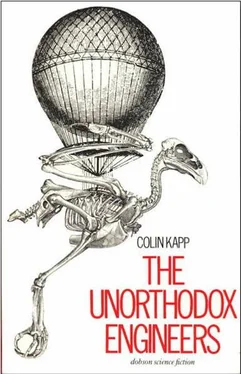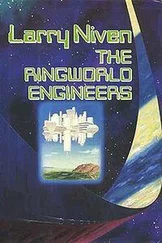‘Working outside the textbooks never worried you before,’ said Jacko. ‘Let’s get out of this place, Fritz. Its giving me the creeps.’
‘In a minute, Jacko. I’d like to explore a bit farther in first.’
They walked together down the remains of a long-forgotten road, treading wearily on the slimed cobbles of the surface. The environment was desolate and forlorn, with an air of perpetual dampness and slow rot and reluctant fungus. As they penetrated to greater depths the gloom grew perceptibly greater, and the cold chill reached a degree where it would have been unwise to remain too long without the protection of additional clothing. Vegetable and animal life were here almost completely absent, and the slime and fungus showed plainly that even the lower life-forms were maintaining their hold only with the greatest difficulty. Even organic decay had not progressed far after two centuries of perpetual winter.
‘What are we looking for, Fritz?’
‘I don’t know. It’s the feel of this cold that has me puzzled. I don’t feel I’m cold just because the environment is cold. I feel I’m cold because my body is radiating more heat than it should at these temperatures. To judge from the feel of my skin it’s about five degrees below freezing point here.’
‘Agreed,’ said Jacko.
‘Then just an observation,’ said van Noon. ‘Why aren’t the puddles of water frozen? It’s my guess that a thermometer wouldn’t give much below ten centigrade. It’s the same effect that we encountered at the perimeter of the Pen—radiant heat being opposed by something only explicable as radiant cold.’
‘I don’t understand that, Fritz. After all, cold is only the absence of heat.’
‘I wonder,’ said van Noon, ‘if that isn’t a limitation to thinking which we’ve imposed upon ourselves.
What happens if we postulate a phenomenon called negative-heat, which we treat as the conventional electromagnetic heat radiation but with the signs reversed?’
‘There can’t be any such animal,’ objected Jacko.
‘No? Fetch some equipment in here and compare the radiant heat loss against temperature and I think you’ll find there is. There has to be. There’s nothing else you could set up in an equation which would go half way to meeting all the facts.’
Something crackled and spat unexpectedly behind them with a sound like a multiple pistol shot. They whirled round and stopped in their tracks. Between them and their path out of the Pen was quite the smallest and darkest and lowest thundercloud they had ever seen. The bottom of the cloud hung probably not more than thirty metres above the ground, and its inky-black consistency made it all the more threatening, though this was probably a trick of light and circumstance.
But it was the lightning which gave them pause to think: vicious arcs between ground and cloud which started to stab with all the anticipated brilliance and fire but which were curiously extinguished by some constrictive phenomenon which pinched the plasma and quenched the arc. The result was a staccato ‘pop’ instead of a thunderclap, and a rate of lightning repetition which occasionally generated a continuous tearing noise rather than the usual sounds of storm. But there was no doubting the destructive potential of the lightning bolts.
Moved by unfelt winds, the thundercloud was drawing rapidly nearer, and van Noon was more than a little apprehensive. ‘Better find some shelter, Jacko. This could be dangerous.’
They looked about them. The ruins of a hovel, partly roofed with sloped and perilous slates, provided the nearest offer of sanctuary. They squatted within the miserable, damp, boxlike walls while the cloud moved overhead. Lightning stabbed at the path outside with a viciousness which seemed to contain some element of personal malice, but finally it passed. The cloud went spitting and snarling on towards the pillar of the Dark, and van Noon and Jacko emerged to watch its progress.
‘I’ll teach Maxwell Courtney to speak of “interesting sub-climate,”’ said van Noon ominously. ‘Let’s get out of here, Jacko.’
‘That was what the locals call a rogue storm,’ said Courtney. ‘In the Pen you meet them quite a lot. They seem to form and disperse almost spontaneously, but while they last they can be very dangerous. They always travel fast, and always in straight lines. If caught in the open we avoid them by simply moving sideways out of the way.’
They were seated in Courtney’s office in New Bedlam, and the broad windows of the room opened to a distant view of the Pen and its core of Dark. Courtney’s desk faced the window as if to give him a constant reminder of the broad enigma to which his life was currently dedicated. The attitude of his visitors’ chairs showed that they were no less aware of the dominating influence of the looming column of shadow.
‘Well,’ said van Noon. ‘We’ve gathered a little data of our own on a preliminary survey, and I’m told you have acquired data by the ton. That puts you in a good position for answering questions, and me for asking them.’
‘Ask away,’ said Courtney. ‘I don’t pretend to have all the answers, but I can do you a nice line in inexplicable facts.’
‘What can you tell me about anti-energy or negative-energy effects?’
Courtney whistled softly. ‘That’s a piece of fast thinking, Fritz. It took us nearly a year before we could bring ourselves to consider the hypothesis seriously. But I know what you’re thinking. Most of the physical effects observed in the Pen can be satisfactorily explained only by thinking in terms of polar opposition— negation by precisely defined effects of exactly opposite character. The fact that these opposite effects are completely unknown to nature outside the Pen doesn’t necessarily invalidate the case for their existence inside the Pen. The very nature of the Pen and the Dark is obviously extra-physical, or we’d not have a problem in the first place.’
‘Precisely!’ said van Noon. ‘But you do agree the possibility of negative-energy?’
Courtney spread his hands. ‘I admit it as a possibility. It’s certainly a basic premise which fits all the observed facts in the Pen. But it’s only one premise among many, and it doesn’t have much to commend it when you consider it a little deeper.’
‘Go on,’ said van Noon.
‘Let’s take an extreme case,’ said Courtney. ‘You can prove it for yourself if necessary, that the difference between the Pen and the Dark is purely one of degree. Whereas energy negation in the Pen is only partial, that of the Dark is absolute.’
‘I’ll take your word for it. I’d guessed it anyway.’
‘Good. Now consider this: no matter what intensity, character, or type of energy we have applied to the Dark, we have had no discernible effect upon it, nor have we been able to pass any energy through even a thin sector of it. We have encountered absolute negation, Fritz, of any energy applied in any way. If you stick to your negative-energy theory the implications are too complex to be true, and rather frightening.’
‘I think I understand you,’ said van Noon, ‘but I’d rather hear it your way.’
‘I’ll put it as simply as I can. If we fire a projectile at it, according to your theory that projectile needs to be met precisely at the perimeter of the Dark by what is effectively a counter projectile of identical mass travelling at an identical velocity to a precisely identical point. That makes too many coincidences for my orthodox-type stomach. And again, suppose we use X-ray bombardment or any other form of radiation. For precise negation this would need to be met at the identical point by anti-radiation of the same intensity, wavelength, and phase as that which we apply. Either the Dark is an extremely broadband transmitter capable of producing any type of force, energy, intensity, and phase of radiation at any point on its perimeter at any instant without prior notice —accurately and instantaneously—or else the Dark is full of little green men with an uncanny knack of anticipating our test programme and arranging their opposing facilities to suit.’
Читать дальше












